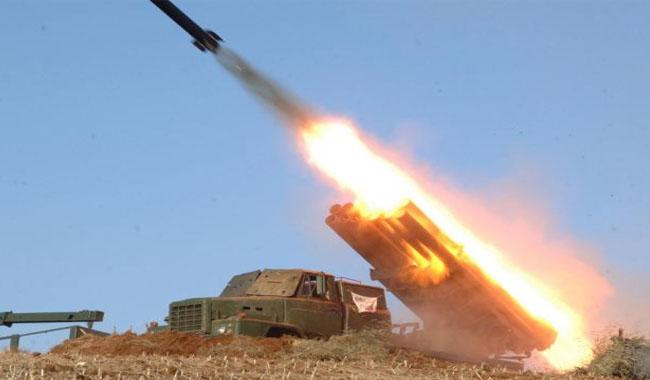SEOUL:
North Korea Sunday test-fired a ballistic missile, the latest in a
series of launches which have sparked international condemnation and
threats of tougher UN sanctions.
South Korea described the launch, the
second in a week and the eighth this year, as "reckless and
irresponsible" while the US military stressed "ironclad commitment" to
defend its allies in the region.
The missile, described by Washington as a
medium-range one, was fired from Pukchang in South Pyongan province and
travelled about 500 kilometres (311 miles), according to the South´s
armed forces.
"Our military is closely monitoring
signs for additional provocation by the North Korean military and we are
keeping a full military readiness," said a statement from the Joint
Chiefs of Staff.
The launch came just one week after the
North fired a Hwasong-12 intermediate-range missile, which according to
Pyongyang flew almost 800 km and was capable of carrying a "heavy"
nuclear warhead. Analysts said the Hwasong travelled further than any
previous ballistic missile launched by the North.
The May 14 launch was seen as a
significant step forward as the North accelerates efforts to develop an
intercontinental ballistic missile (ICBM) capable of delivering a
nuclear warhead to the continental United States.
The launches, and a threatened sixth
nuclear test, have fuelled tension with the administration of US
President Donald Trump, who has vowed that such an ICBM launch "won´t
happen".
A White House official visiting Saudi Arabia with Trump appeared to play down Sunday´s firing.
"We are aware that North Korea launched
an MRBM (medium-range ballistic missile). This system, last tested in
February, has a shorter range than the missiles launched in North
Korea´s three most recent tests," the official said on condition of
anonymity.
But the South´s foreign ministry slammed
the "reckless and irresponsible" firing as "throwing cold water on the
hope and longing of the new government and the international community"
for denuclearisation and peace on the Korean peninsula.
Seoul´s incoming left-leaning government
has taken a more conciliatory line with Pyongyang than its conservative
predecessors, but reacted strongly to the latest two missile tests.
Japanese Prime Minister Shinzo Abe said
the missile launches "trample on efforts by the international community
towards a peaceful solution and are a challenge to the world", Kyodo
News reported.
The US Pacific Command said it tracked the missile until it landed in the Sea of Japan (East Sea).
"US Pacific Command stands behind our
ironclad commitment to the security of our allies in the Republic of
Korea (South Korea) and Japan," it added in a statement.
Pyongyang has long had missiles that can reach targets across South Korea and Japan.
Pyongyang has long had missiles that can reach targets across South Korea and Japan.
With an imputed range of 4,500 kilometres the Hwasong-12 also puts US bases on the Pacific island of Guam within reach.
´Many more´ missiles -The UN Security Council met behind closed doors last Tuesday to discuss tightening sanctions on North Korea after its May 14 launch.
US ambassador Nikki Haley said the United States was working with China, Pyongyang´s main ally, on a new sanctions resolution and warned that all countries must step up action against North Korea or face measures themselves.
The North says it needs missiles and nuclear weapons to deter any attack by the United States, and state newspaper Minju Joson Sunday threatened more launches.
"If the US persists in confrontation with the DPRK (North Korea), the latter will show how the crime-woven history of the US is put to an end," it said.
"Many more ´Juche weapons´ capable of striking the US will be launched from this land. This is the DPRK´s answer to the Trump administration," it said, referring to the national philosophy of "Juche" or self-reliance.

No comments:
Post a Comment